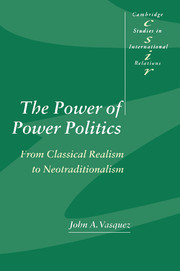Book contents
- Frontmatter
- Contents
- List of figures
- List of tables
- Preface
- Introduction
- Part I The Original Text: Classical Realism and Quantitative International Politics
- Preface to Part I
- Acknowledgments
- 1 The role of paradigms in scientific inquiry: a conceptual framework and a set of principles for paradigm evaluation
- 2 The role of the realist paradigm in the development of a scientific study of international relations
- 3 Research design: defining and operationalizing the realist paradigm
- 4 Theory construction as a paradigm-directed activity
- 5 Data making as a paradigm-directed activity
- 6 Research as a paradigm-directed activity
- 7 Evaluation: the adequacy of the realist paradigm
- 8 Theory and research in the 1970s: the emerging anomalies
- Part II Neorealism and Neotraditionalism: International Relations Theory at the Millennium
- References
- Name index
- Subject index
- CAMBRIDGE STUDIES IN INTERNATIONAL RELATIONS
1 - The role of paradigms in scientific inquiry: a conceptual framework and a set of principles for paradigm evaluation
Published online by Cambridge University Press: 22 September 2009
- Frontmatter
- Contents
- List of figures
- List of tables
- Preface
- Introduction
- Part I The Original Text: Classical Realism and Quantitative International Politics
- Preface to Part I
- Acknowledgments
- 1 The role of paradigms in scientific inquiry: a conceptual framework and a set of principles for paradigm evaluation
- 2 The role of the realist paradigm in the development of a scientific study of international relations
- 3 Research design: defining and operationalizing the realist paradigm
- 4 Theory construction as a paradigm-directed activity
- 5 Data making as a paradigm-directed activity
- 6 Research as a paradigm-directed activity
- 7 Evaluation: the adequacy of the realist paradigm
- 8 Theory and research in the 1970s: the emerging anomalies
- Part II Neorealism and Neotraditionalism: International Relations Theory at the Millennium
- References
- Name index
- Subject index
- CAMBRIDGE STUDIES IN INTERNATIONAL RELATIONS
Summary
The work of Thomas Kuhn (1962, 1970a) has attracted much interest from historians and philosophers of science because it offers a way to describe and evaluate scientific inquiry. For this reason it provides framework for determining whether the realist paradigm has adequately guided inquiry in international relations. Before the framework can be applied, a number of questions that have been raised critics of Kuhn must be addressed. The three most important how to define paradigm; whether Kuhn's description of scientific change is correct; and how paradigms can be evaluated. Each of these will be examined in this chapter.
Defining the concept of paradigm
Despite its wide use, the paradigm concept remains very difficult to define. The reason for this stems from its original usage by Thomas Kuhn in The Structure of Scientific Revolutions (1962). A textual analysis of that work by Margaret Masterman (1970) has shown that concept of paradigm was used by Kuhn in at least twenty-one different ways. In the postscript to the second edition of the book, Kuhn (1970a: 174–191) recognized this criticism and attempted to clarify the definition. He maintains that most of the varying usage is due to stylistic inconsistencies but concedes that even after these inconsistencies removed, the concept is used in two distinct ways:
On the one hand, it stands for the entire constellation of beliefs, values, techniques, and so on shared by the members of a given community. On the other, it denotes one sort of element in that constellation, the concrete puzzle-solutions which, employed as models or examples, can replace explicit rules as a basis for the solution of the remaining puzzles of normal science.
(Kuhn 1970a: 175)- Type
- Chapter
- Information
- The Power of Power PoliticsFrom Classical Realism to Neotraditionalism, pp. 19 - 31Publisher: Cambridge University PressPrint publication year: 1999



